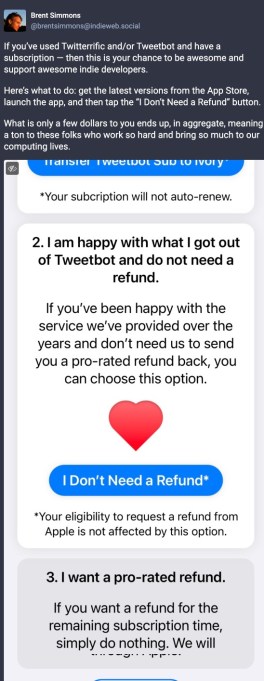
Twitter last month officially banned third-party clients putting a sudden end to popular apps including Tweetbot, Twitterific, and others. Now, in an unusual turn of events, two developers this week have updated their shuttered apps with new functionality: they’re asking their subscribers to decline to receive a refund by clicking a new “I don’t need a refund” button in their non-functional apps. And, in the case of Tapbots’ Tweetbot app, users can opt to transfer their subscription to the company’s newest app — its Maston client Ivory — instead. The options allow subscribers who are sympathetic to these indie developers’ plight to offer support by not asking for their money back.
It’s an unprecedented situation, to say the least, and one most subscription-based iOS apps wouldn’t ever have to face.
In most other scenarios, a company’s decision to put an end to API access, as Twitter did, would have been telegraphed well in advance. This would allow the businesses dependent on the API functionality to communicate with their customers about the change and prepare to take the next steps. The third-party Twitter clients, however, had no warning.
Twitter didn’t communicate ahead of its API changes, and it didn’t even admit to what it had done as the user and developer backlash grew. After initially ignoring the complaints, the company later tweeted that it was only “enforcing its long-standing API rules.” But those rules weren’t documented in its developer terms until after the API access had been yanked. Whatever “long-standing” rules Twitter was referring to still remains unclear. (Perhaps it was that time, 12 years ago, when the company told developers to stop trying to compete by building clients? Who knows!)
While Twitter may have never fully embraced the idea that there were apps offering alternative experiences, it ultimately decided to leave these particular third-party apps alone, even as it cracked down on other API usages. Twitter, it had seemed, begrudgingly acknowledged the apps’ long history of contributing positively to the ecosystem. Plus, they supported some of Twitter’s most devoted users.
Though the apps’ respective userbases were small compared to Twitter’s official app, they were large enough to help sustain the indie developers’ businesses. Like most subscription apps, they also monetized by way of monthly and annual subscriptions on the App Store. That means when Twitter pulled the plug, the companies were left in the unfortunate position of having their expected income almost immediately halted. And in the case of annual subscribers who paid upfront for a year’s service, they would soon have to issue out-of-pocket refunds.
Both apps — Tapbots’ Tweetbot and The Iconfactory’s Twitterific — rolled out app updates on Monday, according to their App Store pages. And now both apps feature similar wording around the requests they put to their subscribers.
In Tweetbot, for example, there are a handful of options to choose from. The top option allows paying customers to click a button to transfer their subscription to the company’s new app, Ivory. A second option reads “I am happy with what I got out of Tweetbot and do not need a refund,” and provides a big, blue “I Don’t Need a Refund” button to click. A third option directs customers who do want a pro-rated refund to do nothing — the refund will be automated through Apple, which is the usual course of action.
Meanwhile, Twitterific’s message is nearly the same but doesn’t offer a subscription transfer option. Unlike Tapbots, the company didn’t build a Mastodon client that would make sense as a new destination for subscribers’ funds. Like Tweetbot, Twitterific also presents an option that reads “I am satisfied with what I got out of Twitterific and do not want a refund at this time,” with a blue button below to click for those who agree. Customers who do want their pro-rated refund are again informed Apple will refund them.
What’s more, Twitterific provides links at the bottom of the screen to other Iconfactory apps, and, not surprisingly, to its Mastodon account.
What’s interesting is that neither company could officially comment on their updates, which indicates Apple likely made a special exception here to its usual App Store rules. (We were directed to reach out to Apple PR for comment, but we haven’t heard back.)
There aren’t too many other situations where apps would be permitted to ask for what are effectively donations by way of subscription payments for non-functional apps. But given the high-profile nature of what happened with Twitter, it makes sense that Apple allowed these apps to make such requests.
Of course, this unique situation requires subscribers to redownload the apps — or update them if still installed — then click the button to stop the otherwise automatic pro-rated refund from occurring. This isn’t ideal. These companies did no wrong and yet will now have to delve into their own pockets to pay out many refunds because a number of customers won’t know to open these apps again in the first place.
Tweetbot and Twitterific ask customers to decline refunds in rare App Store exception by Sarah Perez originally published on TechCrunch




0 Comments